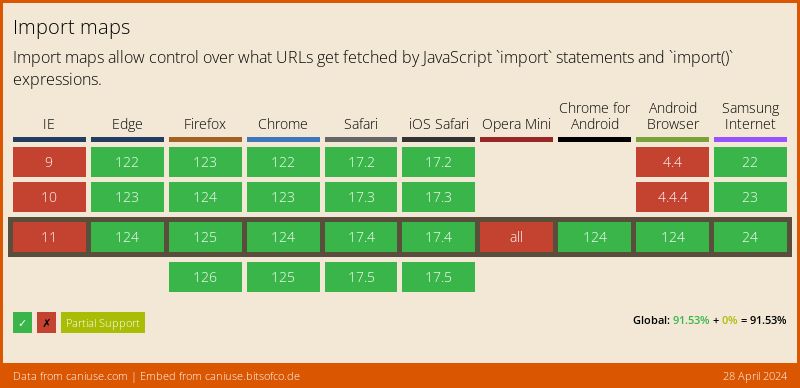
Shipping in Chrome 89 are Import Maps, which allows control over what URLs get fetched when importing modules.
Let’s take a look at this very welcome addition.
When importing ES Modules (on the web), you need to refer to them using their full filenames or URLs:
import moment from "/js/moment/moment.js";
import { partition } from "/js/lodash-es/lodash.js";In a Node environment however, you would write the snippet above as follows:
import moment from "moment";
import { partition } from "lodash";(Node will map things to the /node_modules folder all by itself)
👉 So depending on where you run your code, your import statements need to change. Meh.
~
Thankfully Import Maps provide a solution to this. They allow you to specify which file/URL should be loaded when importing a package.
{
"imports": {
"moment": "/js/moment/moment.js",
"lodash": "/js/lodash-es/lodash.js"
}
}With this in place the browser can handle import { partition } from "lodash" just fine, as it will load the file /js/lodash-es/lodash.js. 🎉
💡 With services like Skypack in place I can already imagine new tools will pop up which would automate the generation of such an import map based on a package[-lock].json that you feed it.
~
An import map is a tad of JSON file which you need to put it in a script[type="importmap"] element:
<script type="importmap">
{
"imports": {
"moment": "/js/moment/moment.js",
"lodash": "/js/lodash-es/lodash.js"
}
}
</script>☝️ In the future it’ll also be possible to to put your import map into an external file and load it by specifying an src
<script type="importmap" src="import-map.importmap"></script>To play nice with Content-Security Policy (CSP) the server needs to send the proper MIME-type though:
application/importmap+jsonFor more advanced usage, it’s also possible to add scoping.
~
These Import Maps sure are a very welcome addition. Unfortunately browser support is currently limited to Chrome only.
Update 2021.09.13: There’s a polyfill available for browsers that don’t support Import Maps: es-module-shims.

💡 Shown above is a dynamic CanIUse.com image, showing an always up-to-date support table. By the time you are reading this browser support might have become better.
Let’s hope other browsers follow suit soon. Relevant bugs to track:
- Safari: https://bugs.webkit.org/show_bug.cgi?id=220823
- Firefox: https://bugzilla.mozilla.org/show_bug.cgi?id=1688879
~
To help spread the contents of this post, feel free to retweet its announcement tweet:
Control the behavior of JavaScript imports with Import Maps
🏷 #EsModules #import #javascript pic.twitter.com/ZrzakJQ4tn
— Bram.us (@bramusblog) March 3, 2021
~
Thank me with a coffee.
I don\'t do this for profit but a small one-time donation would surely put a smile on my face. Thanks!
To stay in the loop you can follow @bramus or follow @bramusblog on Twitter.
Seems, the browser needs to load the import map befory any resolution of import URLs